“National Symposium on High Energy Physics”-enthralling discussion on Particle Physics, Dark Matter and gravitational waves
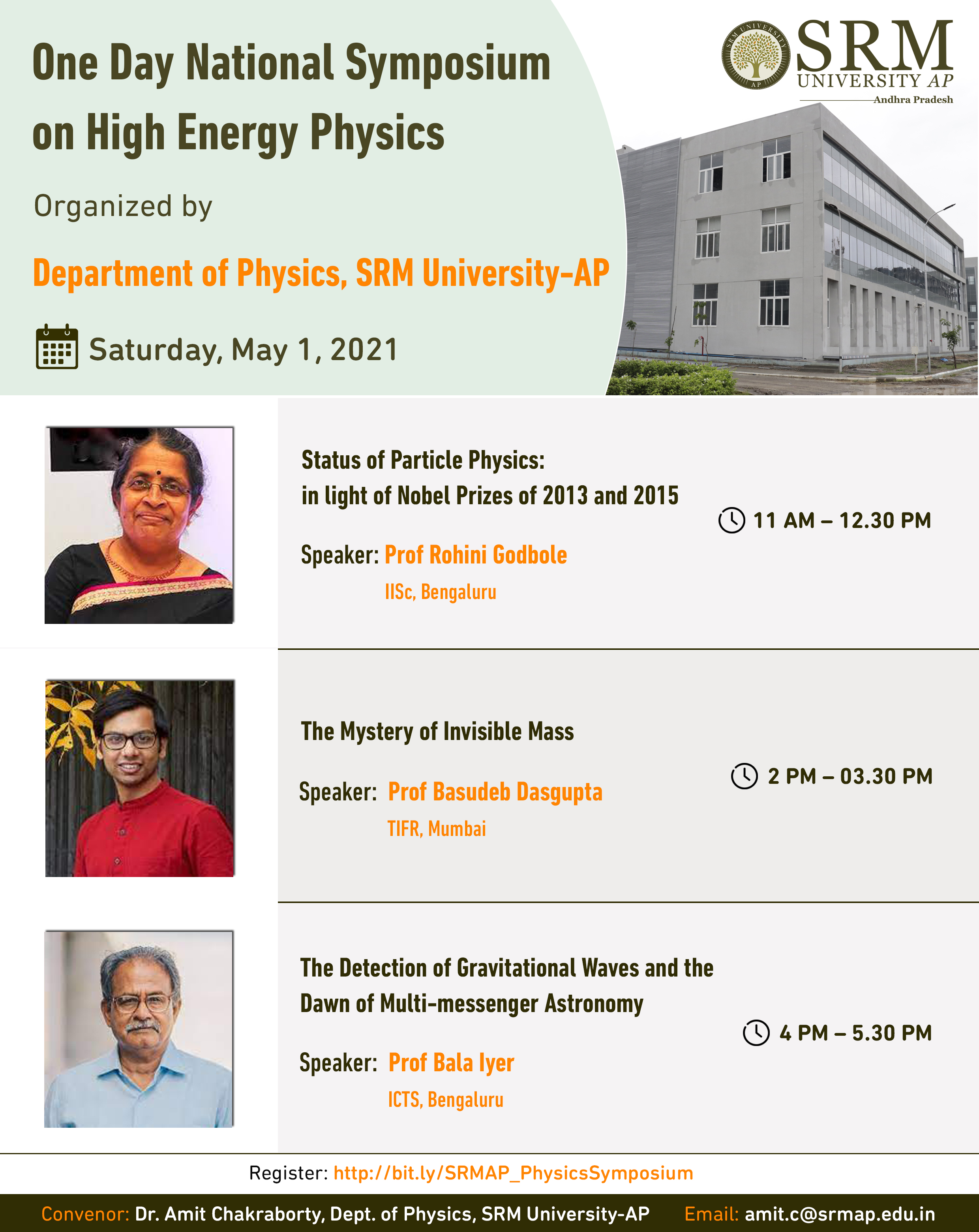 The Department of Physics, SRM University-AP, Andhra Pradesh, has organised a National Symposium on High Energy Physics on Saturday, May 1, 2021, at 11 am. Leading Physicists of the nation are going to share their perspective on the progress and recent challenges in Particle Physics, Dark Matter Physics and Gravitational-Wave Astronomy. Padma Shri awardee Prof Rohini Godbole, theoretical particle physicist at the Indian Institute of Science (IISc), Bengaluru, will present the inaugurating talk on “Status of Particle Physics: in light of Nobel Prizes of 2013 and 2015”. Prof Basudeb Dasgupta from the Tata Institute of Fundamental Research (TIFR), Mumbai, will join us for the next session on “The Mystery of Invisible Mass”. The last talk of the day will be given by Prof. Bala Iyer from the International Centre for Theoretical Sciences (ICTS), Bengaluru. He will shed light on “The Detection of Gravitational Waves and the Dawn of Multi-messenger Astronomy”.
The Department of Physics, SRM University-AP, Andhra Pradesh, has organised a National Symposium on High Energy Physics on Saturday, May 1, 2021, at 11 am. Leading Physicists of the nation are going to share their perspective on the progress and recent challenges in Particle Physics, Dark Matter Physics and Gravitational-Wave Astronomy. Padma Shri awardee Prof Rohini Godbole, theoretical particle physicist at the Indian Institute of Science (IISc), Bengaluru, will present the inaugurating talk on “Status of Particle Physics: in light of Nobel Prizes of 2013 and 2015”. Prof Basudeb Dasgupta from the Tata Institute of Fundamental Research (TIFR), Mumbai, will join us for the next session on “The Mystery of Invisible Mass”. The last talk of the day will be given by Prof. Bala Iyer from the International Centre for Theoretical Sciences (ICTS), Bengaluru. He will shed light on “The Detection of Gravitational Waves and the Dawn of Multi-messenger Astronomy”.
Our first speaker of the day, Prof Rohini M Godbole, is a theoretical particle physicist at the Indian Institute of Science, Bangaluru. Over the past three decades, she has worked extensively on particle physics phenomenology, exploring different theoretical aspects of Standard Model and Beyond Standard Model physics at high energy collider experiments. She is an elected fellow of all the three Academies of Science of India and the Science Academy of the Developing World (TWAS). She has published over 200 research papers and received numerous recognitions from all over the world. Prof Godbole co-edited the book “Lilavati’s Daughters”, a collection of biographical essays on women scientists of India, which was published by the Indian Academy of Sciences. In 2019, she was awarded Padma Shri, the fourth highest civilian honour of the Government of India, for her contribution to Science and Technology.
In 2013, the Nobel prize in Physics was awarded for the theoretical postulate of the Higgs Boson, after the experimental discovery of the same at the LHC in 2012. This was considered being the last missing piece in the periodic table of the Standard Model (SM). In 2015 the Nobel prize in physics was awarded for the experimental discovery of Neutrino oscillations, which is one robust evidence for physics beyond the SM. In her speech, Prof Godbole will comment on the status of particle physics in light of these two and the exciting results on the measurements of the magnetic moment of the muon that have been announced in the previous weeks.
Prof Basudeb Dasgupta is a theoretical physicist at the Tata Institute of Fundamental Research (TIFR), Mumbai. His research interests include the interfaces of particle physics, astrophysics, and cosmology with an emphasis on dark matter and neutrino physics. Prof Dasgupta is also the Leader of the Astroparticle Physics Partner Group of Max-Planck Institute for Physics. Prof Dasgupta is a regular speaker at notable international workshops and conferences and different Science Outreach programmes.
When we look at the night sky, we see a variety of astronomical objects, such as planets, stars, gas clouds, still waiting to form stars to swathe of the emptiness. For a long time, it was believed to be all that the Universe is consists of. The following discoveries came as a huge surprise that all we see and know comprises only about 20% of the matters in the Universe. The remaining 80% is invisible and called “Dark Matter.” What is this dark matter? How do we know that is out there? What is it made of? How can we decipher the nature of this mysterious new ingredient of the cosmic soup? In this talk, Prof Basudeb Dasgupta will address and answer some of these questions.
Prof Bala Iyer is currently the Simons Visiting Professor at ICTS-TIFR Bangalore and CO-PI of the LIGO-India Scientific Collaboration. The alumnus of Bombay University previously worked at the Raman Research Institute, Bangalore, on Astrophysical applications of General Relativity, Perturbation methods and Black Holes. Since 1990, he is working on calculations of Gravitational waves from inspiraling binaries of neutron stars and black holes. He is a Fellow of the American Physical Society and International Society on General Relativity and Gravitation. He has been the Chair of the IndIGO Consortium since its inception in 2009. Prof Iyer was a Member of the Core Team for the LIGO-India Mega-Project Proposal. Further, he is the Chief Editor and Subject Editor of Gravitational Waves for the Online Journal `Living Reviews in Relativity’, published recently by Springer. Prof Bala Iyer has been a Visiting scientist in France, UK, Germany, USA. He has been involved in REAP (Research Education Advancement Programme) for B.Sc students at the Bangalore Planetarium for over two decades and Public outreach on General Relativity and Gravitational Waves.
The first detection of gravitational waves from a black hole binary in 2015 was a breakthrough, taking a century to realise, and made possible by the coming together of a remarkable experiment and an exquisite theory complemented by the best in sophisticated data analyses, state of the art computing and the transition to “big science”. 2017 brought the discovery of gravitational waves from a neutron star binary. The intense associated electromagnetic follow up of this event was spectacular. It heralds the launch of a new multi-messenger astronomy with the potential to impact astrophysics, cosmology and fundamental physics in the coming decades. Prof Bala Iyer will discuss the nature of gravitational wave and its impact on Physics.
The symposium aims to make students aware of the current status of some of the fascinating research topics of High Energy Physics. Students of basic sciences and engineering streams will be highly inspired and motivated after attending the symposium and listening to the talks. Join the captivating event on May 1, 2021, at 11 am.
- Published in Departmental Events, Events, Physics, Webinars
International Conclave on the Role of Technology for the Sustainable Agricultural Growth for Future Generations
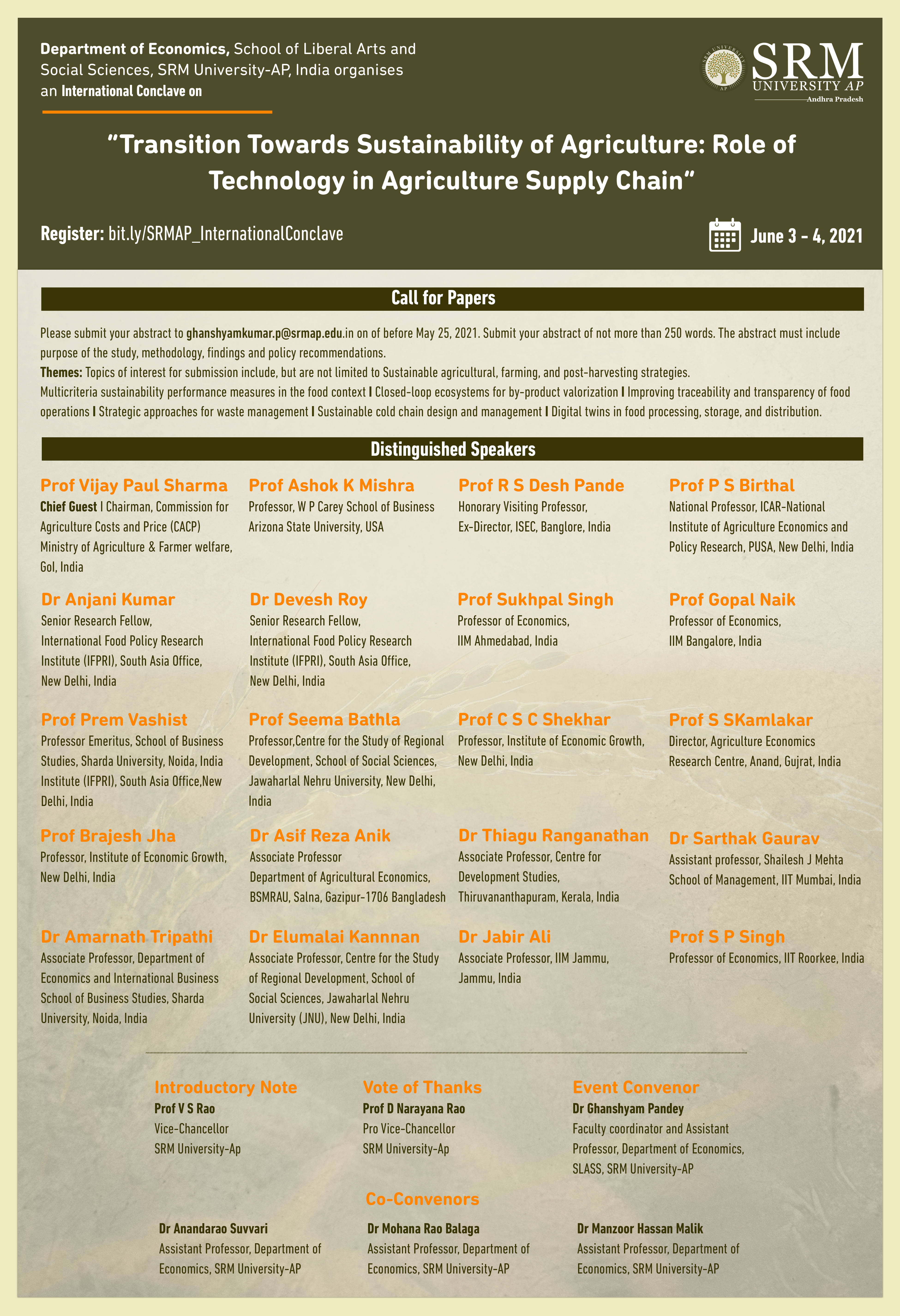 An International Conclave on the “Transition towards sustainability of Agriculture: Role of Technology in Agriculture Supply Chain” is being organised by the Department of Economics, School of Liberal Arts and Social Sciences, SRM University-AP, Andhra Pradesh on June 3-4 from 9 am. Renowned economists and experts across the world will be joining the conclave to share their thoughts and perspectives on the much-needed topic of this time. Faculty and Scholars are invited to submit the abstracts of their research papers on or before May 25, 2021. Prof Vijay Paul Sharma, Chairman, Commission for Agriculture Costs and Price (CACP) Ministry of Agriculture & Farmer Welfare, Govt of India, will grace the conclave with his presence as the Chief Guest.
An International Conclave on the “Transition towards sustainability of Agriculture: Role of Technology in Agriculture Supply Chain” is being organised by the Department of Economics, School of Liberal Arts and Social Sciences, SRM University-AP, Andhra Pradesh on June 3-4 from 9 am. Renowned economists and experts across the world will be joining the conclave to share their thoughts and perspectives on the much-needed topic of this time. Faculty and Scholars are invited to submit the abstracts of their research papers on or before May 25, 2021. Prof Vijay Paul Sharma, Chairman, Commission for Agriculture Costs and Price (CACP) Ministry of Agriculture & Farmer Welfare, Govt of India, will grace the conclave with his presence as the Chief Guest.
The agriculture and food sectors are facing multiple challenges. With the global population projected to grow from 7.6 billion in 2018 (UN DESA, 2019) to over 9.6 billion in 2050, there will be a significant increase in the demand for food (UN DESA, 2017). At the same time, the availability of natural resources such as fresh water and productive arable land is becoming increasingly constrained. Production is not the only concern; although agricultural output is currently enough to feed the world, 821 million people still suffer from hunger (FAO, 2018). Processes such as the rapid rate of urbanisation also have important implications for food production patterns and consumption. The agri-food sector remains critical for livelihoods and employment. There are more than 570 million smallholder farms worldwide (Lowder et al., 2016), and agriculture and food productions account for 28% of the entire global workforce (ILOSTAT, 2019).
Achieving the UN Sustainable Development Goal of a ‘world with zero hunger’ by 2030 will require more productive, efficient, sustainable, inclusive, transparent and resilient food systems. This will require an urgent transformation of the current agri-food system. Digital innovations and technologies may be part of the solution. The so-called ‘Fourth Industrial Revolution’ (Industry 4.0) observes several sectors to be transformed rapidly by ‘disruptive’ digital technologies such as Blockchain, Internet of Things, Artificial Intelligence and Immersed Reality. In the agriculture and food sectors, the spread of mobile technologies, remote-sensing services and distributed computing are already improving smallholders’ access to information, inputs, market, finance and training. Digital technologies are creating new opportunities to integrate smallholders into a digitally-driven agri-food system. In this two-day Internation Conclave, reputed experts will shed some light by sharing their wisdom with others on the recent challenges and the scope associated with it. Needless to say, food will always be an integral part of the basic need of humans. In these discussions, the path towards ensuring enough food supply for future generations will be searched.
The Department of Economics, under the School of Liberal Arts and Social Sciences at SRM University-AP, is a vibrant unit for teaching fundamental courses (core & electives) in Economics along with allied courses for students across the disciplines. In addition to the Foundation Courses and optional Minors across the departments, the department ensures that the education imparted is truly multidisciplinary with an excellent programme structure that can cater to the growing market demand for professional economists and policy researchers. At Present, the department offers B.Sc. (Hons.) and PhD in Economics and will soon offer a postgraduate programme with specialisations in Econometrics, Finance, Trade and Development in coming years.
Call for Papers:
Faculty and Scholars are invited to submit the abstracts to be presented at the conclave “Transition towards sustainability of Agriculture: Role of Technology in Agriculture Supply Chain” on or before May 25, 2021. The abstract must go through the review, and if accepted by the reviewers, the abstract acceptance notification will be sent. There is no registration fee to participate in the conclave. The event will take place entirely in virtual mode. Please submit the abstracts to ghanshyamkumar.p@srmap.edu.in on or before May 25, 2021. Abstracts should not be more than 250 words, and it must include the purpose of the study, methodology, findings and policy recommendations.
Themes:
Topics of interest for submission include, but are not limited to:
- Sustainable agricultural, farming, and post-harvesting strategies
- Multicriteria sustainability performance measures in the food context
- Closed-loop ecosystems for by-product valorisation
- Improving traceability and transparency of food operations
- Strategic approaches for waste management
- Sustainable cold chain design and management
- Digital twins in food processing, storage, and distribution
Distinguished Speakers:
- Prof Vijay Paul Sharma, Chairman, Commission for Agriculture Costs and Price (CACP)Ministry of Agriculture & Farmer Welfare, Govt of India
- Prof Ashok K Mishra, Professor, W P Carey School of Business, Arizona State University, USA
- Prof R S Deshpande, Honorary Visiting Professor, Ex-Director, ISEC, Bangalore, India
- Prof P S Birthal, National Professor, ICAR-National Institute of Agriculture Economics and Policy Research, PUSA, New Delhi, India
- Dr Anjani Kumar, Senior Research Fellow, International Food Policy Research Institute (IFPRI), South Asia Office, New Delhi, India
- Dr Devesh Roy, Senior Research Fellow, International Food Policy Research Institute (IFPRI), South Asia Office, New Delhi, India
- Prof Sukhpal Singh, Professor of Economics, IIM Ahmedabad, India
- Prof Gopal Naik, Professor of Economics, IIM Bangalore, India
- Prof Prem Vashisth, Professor Emeritus, School of Business Studies, Sharda University, Noida, India
- Prof Seema Bathla, Professor, Centre for the Study of Regional Development, School of Social Sciences, Jawaharlal Nehru University, New Delhi, India
- Prof C S C Shekhar, Professor, Institute of Economic Growth, New Delhi, India
- Prof S S Kamlakar, Director, Agriculture Economics Research Centre, Anand, Gujrat, India
- Prof Brajesh Jha Professor, Institute of Economic Growth, New Delhi, India
- Dr Asif Reza Anik Associate Professor Department of Agricultural Economics Bangabandhu Sheikh Mujibur Rahman Agricultural University (BSMRAU) Salna, Gazipur-1706 Bangladesh
- Dr Thiagu Ranganathan, Associate Professor, Centre for Development Studies, Thiruvananthapuram, Kerala, India
- Dr Sarthak Gaurav Assistant professor, Shailesh J Mehta School of Management, IIT, Mumbai, India
- Dr Amarnath Tripathi, Associate Professor, Department of Economics and International Business School of Business Studies, Sharda University, Noida, India
- Dr Elumalai Kannnan, Associate Professor, Centre for the Study of Regional Development, School of Social Sciences, Jawaharlal Nehru University (JNU), New Delhi, India
- Dr Jabir Ali, Associate Professor, IIM Jammu, Jammu, India
- Prof S P Singh, Professor of Economics, IIT Roorkee, India
Registration Link: https://srmap.zoom.us/webinar/register/WN_LhUJ0qKwQbeZpXj02y7CXQ
Brochure: Click here to view the detailed brochure
- Published in Conferences, Departmental Events, Economics Events, Events, Webinars
Dr Ramana Vinjamuri to expose the fascinating tale of “Synergy Based Human Machine Interfaces”
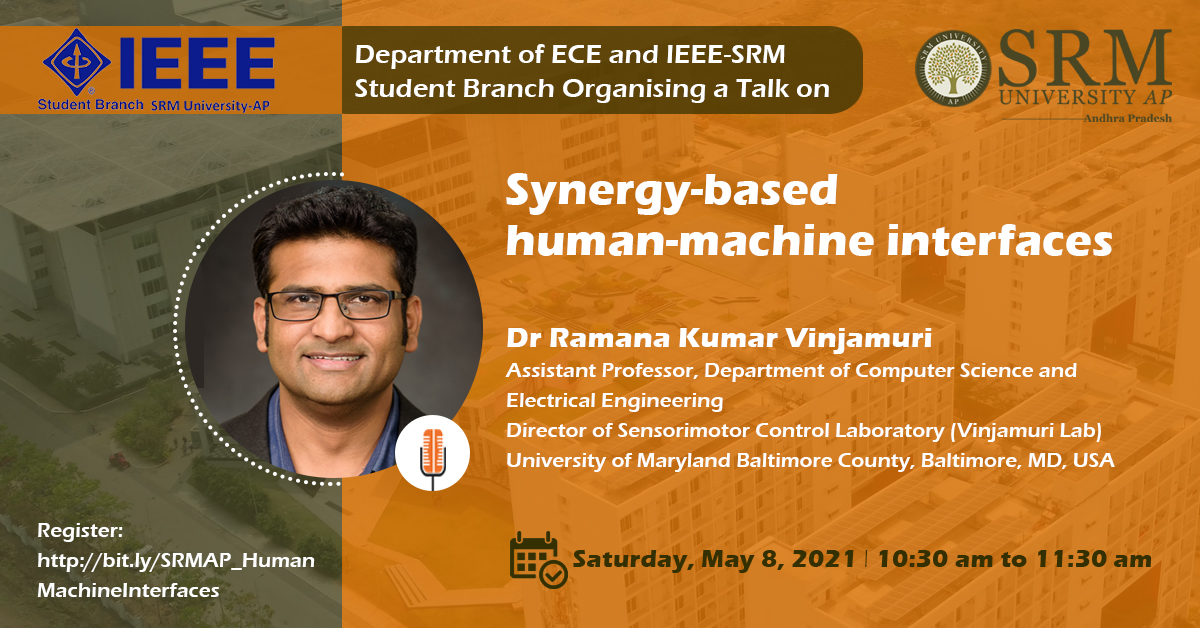 In collaboration with IEEE-SRM Student Branch, Department of Electronics and Communication Engineering, SRM University-AP, Andhra Pradesh, is organising a highly called for discussion on “Synergy Based Human Machine Interfaces”. The event has been scheduled for May 8, 2021, at 10:30 am. Dr Ramana Kumar Vinjamuri, Assistant Professor, Department of Computer Science and Electrical Engineering and Director of Sensorimotor Control Laboratory (Vinjamuri Lab), University of Maryland Baltimore County, Baltimore, MD, USA, will honour us with his presence as the keynote speaker.
In collaboration with IEEE-SRM Student Branch, Department of Electronics and Communication Engineering, SRM University-AP, Andhra Pradesh, is organising a highly called for discussion on “Synergy Based Human Machine Interfaces”. The event has been scheduled for May 8, 2021, at 10:30 am. Dr Ramana Kumar Vinjamuri, Assistant Professor, Department of Computer Science and Electrical Engineering and Director of Sensorimotor Control Laboratory (Vinjamuri Lab), University of Maryland Baltimore County, Baltimore, MD, USA, will honour us with his presence as the keynote speaker.
Human-machine interface (HMI) has not only become a popular technology but has become the hope of many individuals for restoring their lost limb function. Any HMI has two important intrinsic design components—(i) decode the human commands and (ii) controlling the machine to convert that command into action. Decades of research went into making the interface between the human and the machine seamless but was unable to effectively address the inherent challenges, namely, complexity, adaptability and variability.
To overcome the above challenges, it is critical to computationally understand and quantitatively characterise human sensorimotor control. Emerging areas in HMIs critically depend on the ability to build bioinspired models, experimentally validate them and utilise them in adaptive and intuitive control. The human hand with high dimensionality encompasses the three inherent challenges and may serve as an ideal validation paradigm. How central nervous system (CNS) controls this high dimensional human hand effortlessly is still an unsolved mystery.
To address this high dimensional control problem, many bioinspired motor control models have been proposed, one of which is based on synergies. According to this model, instead of controlling individual motor units, CNS simplifies the control using coordinated control of groups of motor units called synergies. However, there are several unanswered questions today— Where are synergies present in CNS? What is their role in motor control and motor learning? By combining the concepts of human motor control, computational neuroscience, machine learning and validation with noninvasive human experiments, can we answer these fundamental questions? The goal of this research is to develop efficient, seamless and near-natural human-machine interfaces based on biomimetically inspired models.
Dr Ramana Vinjamuri received his PhD in Electrical Engineering in 2008, specialised in dimensionality reduction in control and coordination of human hand from the University of Pittsburgh. He worked as a postdoctoral research associate (2008-2012) in the field of Brain-Machine Interfaces (BMI) to control prosthesis in the School of Medicine, the University of Pittsburgh, where he received Mary E Switzer Merit Fellowship from NIDILRR in 2010. Prior to that, he worked as a Research Assistant Professor in the Department of Biomedical Engineering at Johns Hopkins University (2012-2013) in the area of neuroprosthetics. He also served as an Assistant Professor in the Department of Biomedical Engineering at Stevens Institute of Technology (2013-2020). In 2018, he received Harvey N Davis Distinguished Teaching Award for excellence in undergraduate and graduate teaching. He earned the NSF CAREER Award in 2019 and NSF IUCRC Center Planning grant in 2020. His other notable research awards are from USISTEF and New Jersey Health Foundation. He holds a secondary appointment as an Adjunct Assistant Professor at the Indian Institute of Technology, Hyderabad, India. He is currently an Assistant Professor in the Department of Computer Science and Electrical Engineering at the University of Maryland Baltimore County.
- Published in Departmental Events, ECE Events, Events, Webinars
Prof Arunan to usher into the advancement of Molecular Beam Microwave Spectroscopy
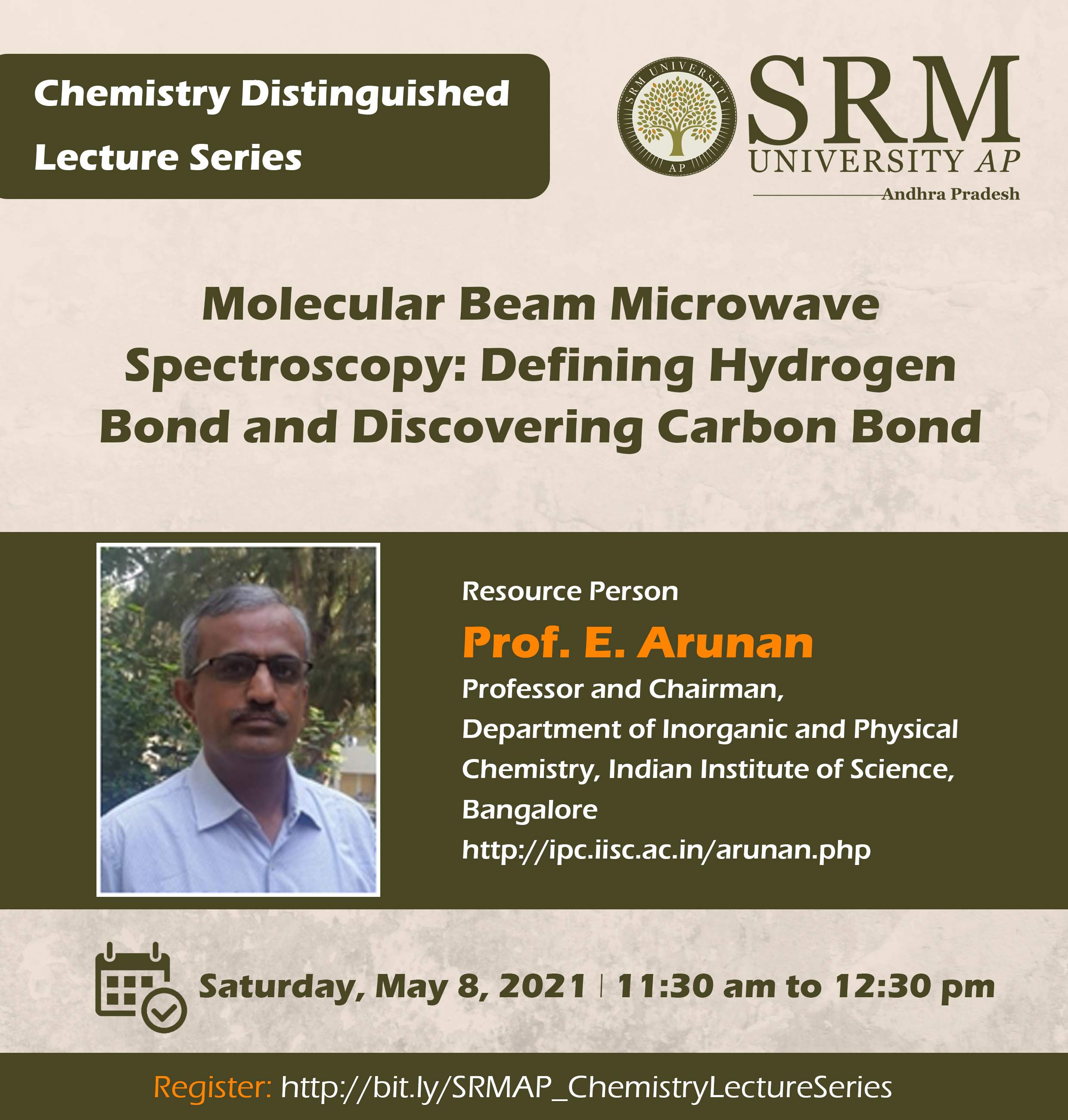 The Chemistry Distinguished Lectures series starts its voyage towards transcendental knowledge with an exciting discussion on “Molecular Beam Microwave Spectroscopy: Defining Hydrogen Bond and Discovering Carbon Bond” on May 8, 2021, at 11.30 am. Renowned scientist and Professor E Arunan from the Department of Inorganic and Physical Chemistry, Indian Institute of Science (IISc), Bangalore, will join the webinar as the Keynote Speaker.
The Chemistry Distinguished Lectures series starts its voyage towards transcendental knowledge with an exciting discussion on “Molecular Beam Microwave Spectroscopy: Defining Hydrogen Bond and Discovering Carbon Bond” on May 8, 2021, at 11.30 am. Renowned scientist and Professor E Arunan from the Department of Inorganic and Physical Chemistry, Indian Institute of Science (IISc), Bangalore, will join the webinar as the Keynote Speaker.
Professor Arunan has extensive research experience in the field of Chemical Sciences and is long associated with IISc, Bangalore, one of the premier institutes of India. Dr Arunan pursued his undergraduate studies at The American College, Madurai, followed by two masters from IIT Madras and IIT Delhi. He obtained his doctoral degree from Kansas State University, USA. Prior to becoming an academician, he worked as a Post-Doctoral Scholar at the University of Illinois at Urbana-Champaign. Prof Arunan started his career as an Assistant Professor at the Department of Chemistry, IIT-Kanpur in 1995. He later moved to the Department of Inorganic and Physical Chemistry, IISc, Bangalore and became a Professor in 2009 and Chairman in 2018.
Prof Arunan’s research interests include experimental physical chemistry, molecular and van der Waals spectroscopy, chemical kinetics and dynamics, hydrogen bonding and other intermolecular bonds/interactions, shock wave interactions with molecules and materials, astrophysics/astrochemistry. He has published around 100 papers in peer-reviewed international Journals, 14 in International Conference Proceedings, 8 in Resonance, the Journal of Education and 16 in Current Science, published by the Indian Academy of Sciences. The celebrated personality has given numerous plenary, keynote and invited lectures all over India and many countries in the world, including the USA, UK, France, Germany, Italy, Poland, Spain, Portugal, Hungary, Finland, Russia, Australia, Czech Republic, China, Pakistan, Bangladesh, Singapore and South Korea. He has delivered inspiring talks at most of the premier institutes in India and also in colleges and high schools all over India.
Prof Arunan is a Fellow of International Union of Pure and Applied Chemistry, Indian Academy of Sciences and a member of the International Advisory Board for ‘Horizons in Hydrogen Bond Research” Conference 2011, International Advisory Board for the Asian Spectroscopy Conference 2009-2013, Programme Advisory Committee on Physical Chemistry, Department of Science and Technology 2008-2012, International Advisory Editorial Board for Physical Chemistry Chemical Physics, Royal Society Publication, From 2005 and many other organisations and advisory boards. Further, he is serving the scientific community as the Section Editor (Chemistry) for Current Science from 2018, Associate Editor from 2013, Associate Editor for Journal of Chemical Sciences from 2012-2016.
Prof Arunan’s contributions to the world of Chemical Sciences has been acknowledged with many awards and accolades. He was the recipient of the Chemical Research Society of India Bronze Medal 2008. He is also the Founder Member cum Vice-President of the Indian Society for Shockwave Research.
Chemistry enthusiasts are encouraged to join the webinar to learn more on the Molecular Beam Microwave Spectroscopy from the expert himself on May 8, 2021, at 11.30 am.
- Published in Chemistry Events, Events, Webinars
Erasmus Mundus Scholarship: Bismark reveals his secret on “The Newsmakers”
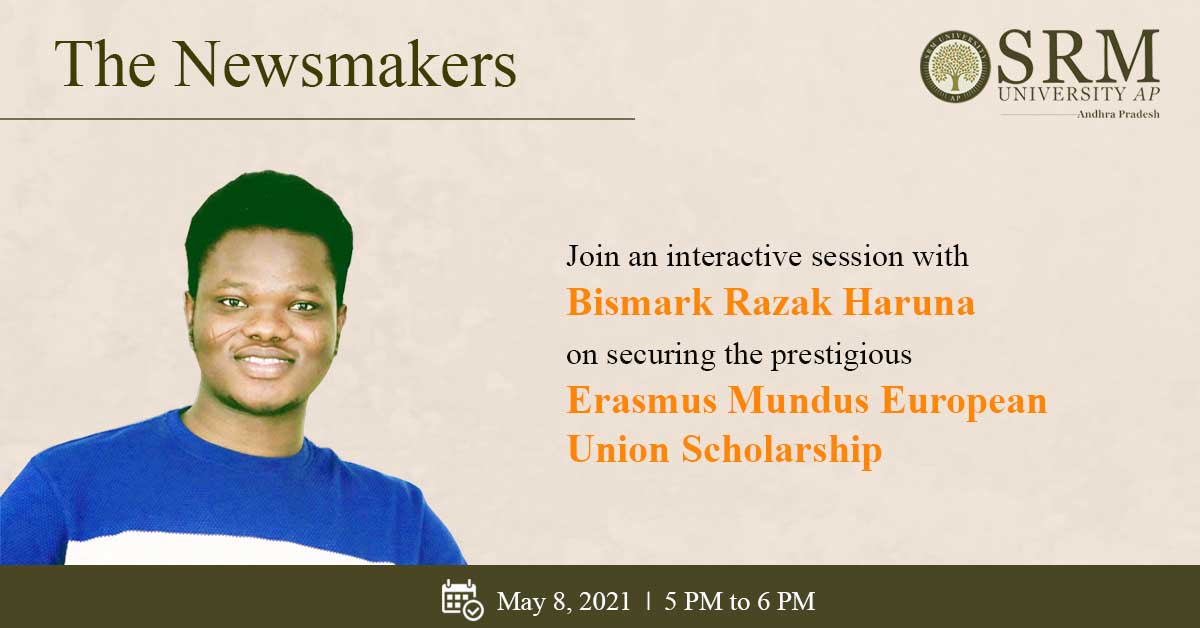 The exalting sessions on “The Newsmakers” leave no stone unturned to inspire students with motivating stories of their peers and known personalities. The Department of Student Affairs presents Bismark Razak Haruna in this week’s session. Bismark, a B. Tech Final Year Student at the Department of Mechanical Engineering, is deemed to be bestowed on the highly prestigious Erasmus Mundus scholarship. The globally acclaimed European Union-funded scholarship will help Bismark pursue the joint master’s degree programme in Decentralised Smart Energy Systems (DENSYS) in renowned universities of Europe.
The exalting sessions on “The Newsmakers” leave no stone unturned to inspire students with motivating stories of their peers and known personalities. The Department of Student Affairs presents Bismark Razak Haruna in this week’s session. Bismark, a B. Tech Final Year Student at the Department of Mechanical Engineering, is deemed to be bestowed on the highly prestigious Erasmus Mundus scholarship. The globally acclaimed European Union-funded scholarship will help Bismark pursue the joint master’s degree programme in Decentralised Smart Energy Systems (DENSYS) in renowned universities of Europe.
Bismark sets an example by being the first Ghanaian to get into the DENSYS program. He expressed that as part of the mobility scheme of the programme, he would pursue the first year at the University of Lorraine, Nancy, France, and continue the final year at the Polytechnic University of Catalonia, Barcelona, Spain. The Erasmus Mundus Scholarship help students enrol into the world’s best universities for masters and doctoral programmes with substantial benefits. Needless to say, it is an exceptional achievement to secure the prestigious scholarship out of numerous candidates all over the world.
Join the session on May 8, 2021, at 5 pm with Bismark to know his journey so far.
- Published in Events, Students Affairs Events, Webinars
The live medical consultation session, “Talk to Your Doctor”, to stream every Saturday
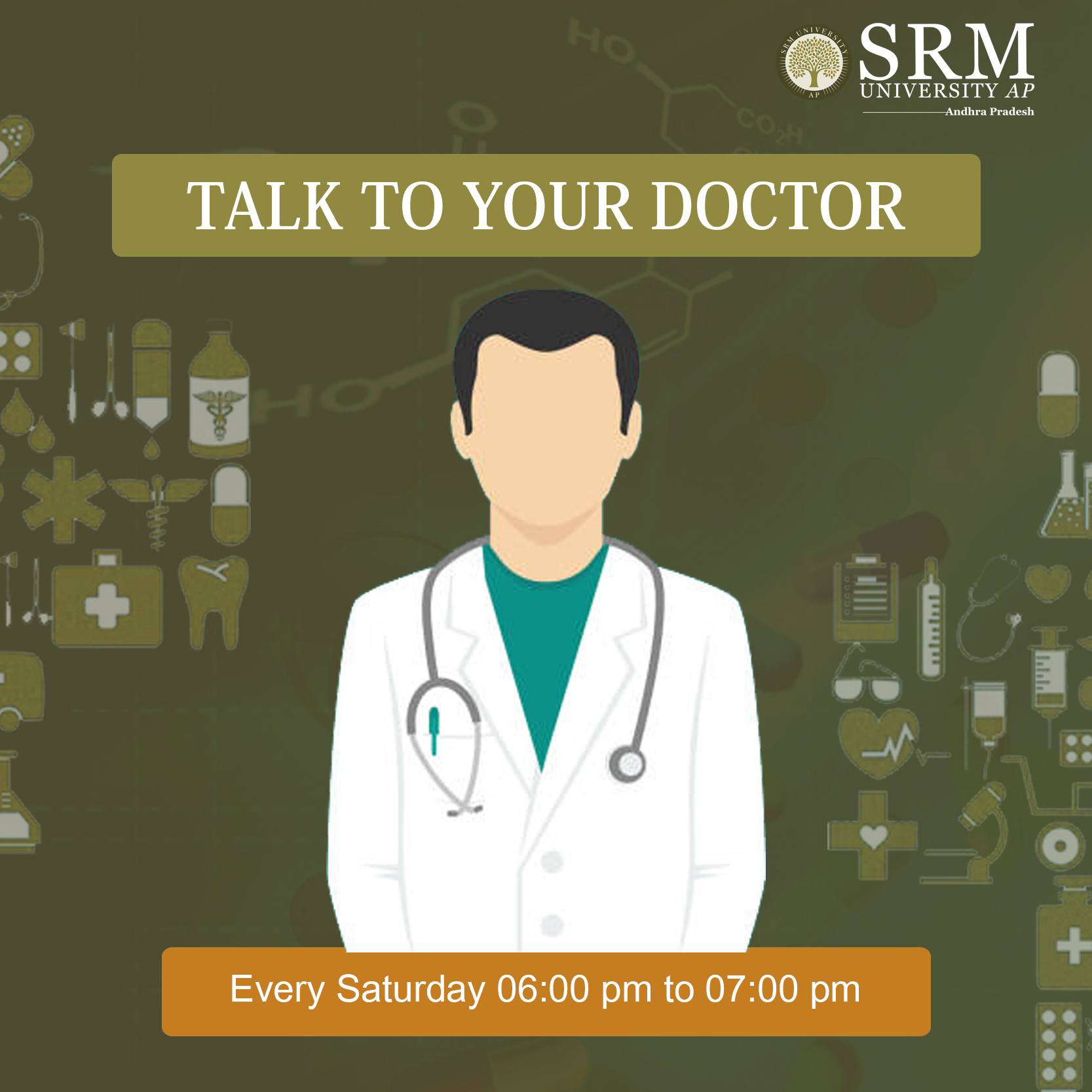 Health and Fitness are the most significant aspects of our lives. These are the two “known “terms going hand in hand. Regular consultations with trusted and experienced medical experts are necessary when health is a concerning factor amid the COVID-19 Pandemic. SRM University-AP steps forward to offer an avenue for its students, staff and faculty members to discuss their health-related issues. It is a free online medical consultation programme that will take place every Saturday, May 08, from 6 pm onwards. Distinguished medical officers of the institute Dr Lakshmi Rajyam and Dr Lakshmi Kiran Talluri, would address the session.
Health and Fitness are the most significant aspects of our lives. These are the two “known “terms going hand in hand. Regular consultations with trusted and experienced medical experts are necessary when health is a concerning factor amid the COVID-19 Pandemic. SRM University-AP steps forward to offer an avenue for its students, staff and faculty members to discuss their health-related issues. It is a free online medical consultation programme that will take place every Saturday, May 08, from 6 pm onwards. Distinguished medical officers of the institute Dr Lakshmi Rajyam and Dr Lakshmi Kiran Talluri, would address the session.
In this scenario where individuals are more prone to get infected by a fatal disease, people must clarify all health-related questions on symptoms, causes and treatment. The one-hour long consultation session would be a valuable platform for getting responses on health-related issues and bursting the myth regarding diseases. Due to COVID-19, when people are not inclined to visit the clinics and hospitals, they can obtain detailed information on their queries through online consultation with these medical experts.
Dr Lakshmi Rajyam is a distinguished personality serving the medical science fraternity for over 42 years and is currently associated with SRM University-AP as the Chief Medical Officer. She has vast experience working with reputed hospitals in the country and can enlighten the participants on testing, treatment, and medication. Since 2017, Dr Rajyam has been an integral part of the SRM Group and is looking after the health and welfare of the University associates in challenging times.
Dr Lakshmi Kiran Talluri is the young mind in the medical team of SRM University-AP. He has completed his MBBS from the NRI College of Medical, Guntur, Andhra Pradesh, and has pledged to render the best services to the community.
With the growing stress in life, people are succumbed to fatal diseases and face an early death—the only way to prevent fatality is the diagnosis and proper medication. Here the medical experts can enrich the participants with the necessary knowledge. The faculty, staff and students of the University are requested to join the session every Saturday from May 08 at 6 pm to satisfy their queries
- Published in Events, Students Affairs Events, Webinars
Weekly Live Discussions on the Mental Health and its Related Issues
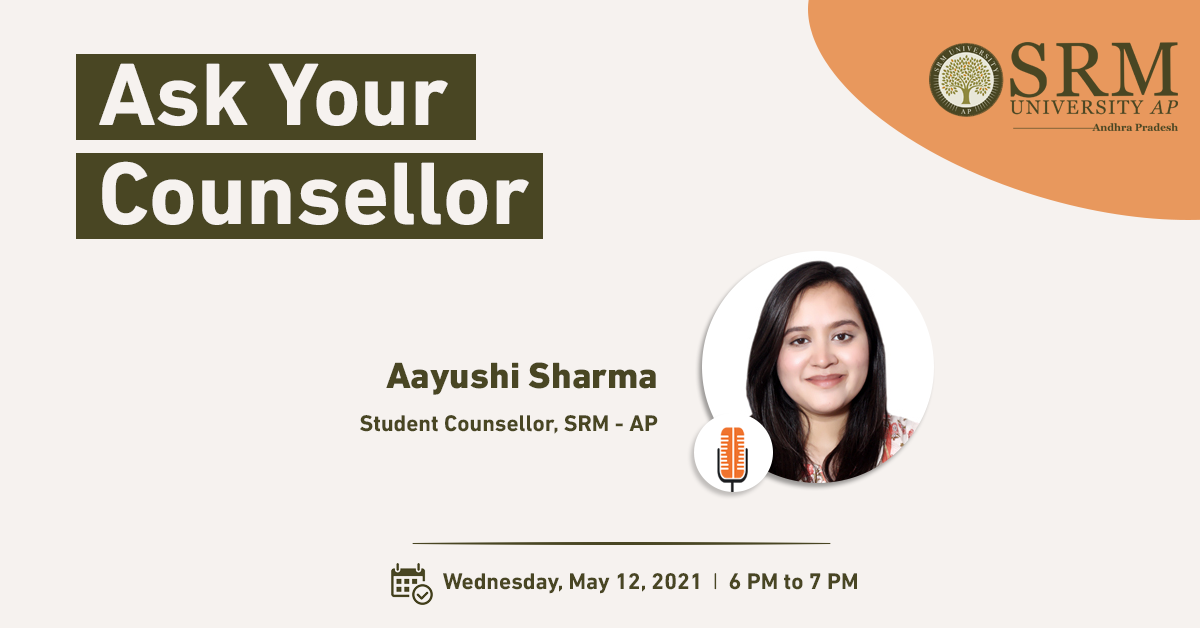 Amidst the catastrophic situation of Covid-19, more than half of the population suffers from mental health-related issues. As per the reports of the Centre for Urban Design and Mental Health, about 60 per cent of the urban dwellers are victimised to depression, anxiety, stress, and loneliness.
Amidst the catastrophic situation of Covid-19, more than half of the population suffers from mental health-related issues. As per the reports of the Centre for Urban Design and Mental Health, about 60 per cent of the urban dwellers are victimised to depression, anxiety, stress, and loneliness.
It is highly needed to combat the battle of mental disorder with firm steps. SRM University, AP, Andhra Pradesh has come forward to join hands in the mission by initiating a weekly discussion session, “Ask your Counsellor,” starting on May 12, 2021, at 6 pm, to stream live every Wednesday. The Department of Student Affair organises it, presenting Ms Aayushi Sharma, the Student Counsellor who would respond to all queries related to mental health and its illness.
Covid-19 Pandemic created a huge impact on the mental well-being of individuals. The aim of organising such discussions is to encourage individuals suffering from mental health-related issues to come out and consult with an expert/ counsellor. It is high time that we break the stigmas revolving around mental health and its related issues.
An expert in the psychological and behavioural sciences, Ms Aayushi Sharma, has joined SRMAP as the student’s counsellor in the Department of the Students Affair. She completed her master’s in arts (Psychology) from the Amity University, Noida, Delhi, India. Ms Sharma guides student and associates to cope with mental health-related concerns and directs them to take adequate care.
When the world is under an alarming situation due to covid-19, it is significant to keep positive approaches and conduct open discussions over “Health and mental well-being”. Join the event every Wednesday at 6 pm to enlighten the facts about mental health conditions and clarify the queries.
- Published in Events, Students Affairs Events, Webinars
A pertinent discussion on “Higher Education in India in the Post-COVID-19” with Prof Anil Sahasrabudhe
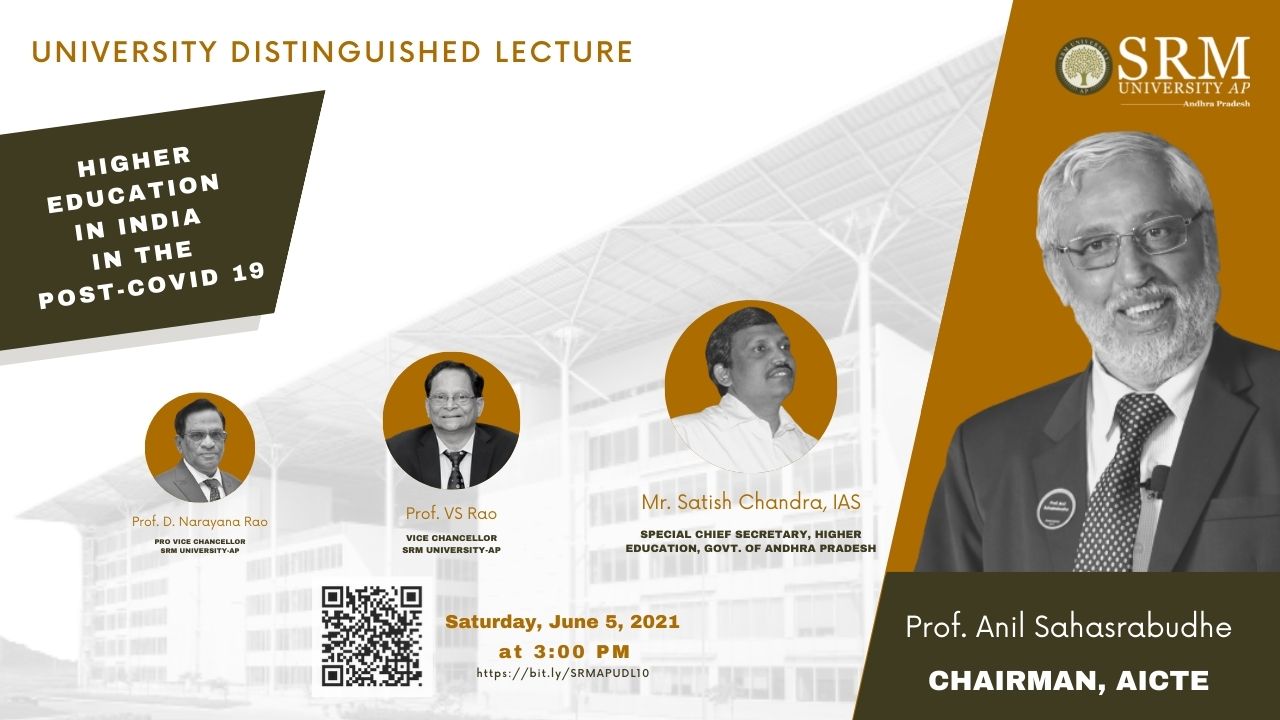 SRM University-AP presents the tenth edition of the University Distinguished Lecture Series with a relevant discussion on “Higher Education in India in the Post-COVID-19”. The webinar has been scheduled for Saturday, June 05, 2021, at 3 pm. Prof Anil Sahasrabudhe, Chairman of All India Council for Technical Education (AICTE), will join the webinar as the chief guest. Shri Satish Chandra, IAS, Special Chief Secretary, Higher Education, Government of Andhra Pradesh will give a special address.
SRM University-AP presents the tenth edition of the University Distinguished Lecture Series with a relevant discussion on “Higher Education in India in the Post-COVID-19”. The webinar has been scheduled for Saturday, June 05, 2021, at 3 pm. Prof Anil Sahasrabudhe, Chairman of All India Council for Technical Education (AICTE), will join the webinar as the chief guest. Shri Satish Chandra, IAS, Special Chief Secretary, Higher Education, Government of Andhra Pradesh will give a special address.
Prof Anil Dattatraya Sahasrabudhe is currently Chairman of the All India Council for Technical Education (AICTE). He was previously a Professor of Mechanical Engineering at Indian Institute of Technology (IIT)-Guwahati for 11 years.
Prof Anil D Sahasrabudhe has held several important Academic, Research and Administrative positions at the Indian Institute of Science, Bangalore, Tata Consulting Engineers, North Eastern Regional Institute of Science and Technology (NERIST), Itanagar (Arunachal Pradesh) and IIT Guwahati. He also served as Director, College of Engineering, Pune (CoEP) since 2006 on deputation from IIT, Guwahati, prior to joining as AICTE Chairman.
He is also the Chairman, Basic Scientific Research (BSR), Empowered Committee of UGC & SWAYAM Board. He is a Fellow of ISTE, IET, Institution of Engineers (IE), INAE.
As an academician and researcher in NERIST and IIT Guwahati, and an administrator at CoEP, he took up several initiatives for Academic, Curricular & Co-curricular activities, Entrepreneurship, Research and Good Governance.
Prof Anil Sahasrabudhe has been bestowed with several awards, which include “Maha-Intrapreneur Award-2011” of Praj Industries, Jeevan Gaurav Puraskar (Life Time Achievement Award) from MIT World Peace University, Pune in 2019, Mahatma Gandhi Leadership award from Indian Achievers Forum and CSR Times (2019).
Join the captivating webinar on June 5, 2021, at 3 pm to be a part of an exciting discussion on the Changing scenario of Higher Education in the Post-COVID era.
Register: http://bit.ly/SRMAPUDL10 (Registration Closed)
Programme Schedule: Know the detailed schedule here
- Published in Events, Research Events, University Distinguished Lecture, Webinars
SRMAP-TBI launches the first cohort of 36 start-up ventures
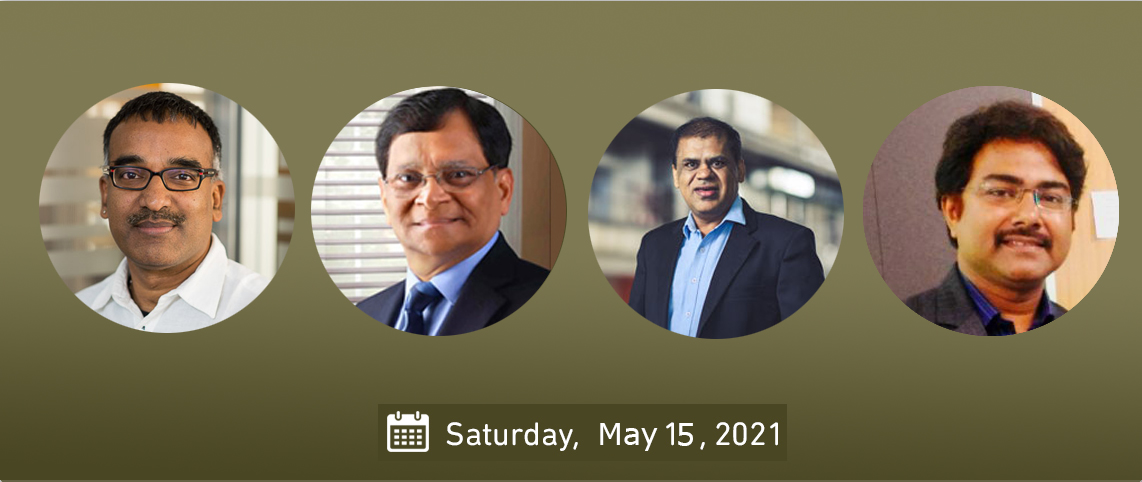
Technology Business Incubator of SRM University-AP launched the first venture cohort with 36 selected startup business ventures, on May 15, 2021, in the presence of the special guest of honour from industry, Prof Ramesh Loganathan, Head of co-innovation and outreach at IIIT Hyderabad and Ex-Chief Innovation Officer of the Telangana State Innovation Cell (TSIC).
“From the initial years onwards, SRM University-AP is focused to make entrepreneurs who can be the leaders of tomorrow. The University signed an MOU with the University of California, Berkeley to design the curriculum to promote entrepreneurship,” Said Prof V S Rao, Vice-Chancellor, SRM University-AP, in his welcome speech.
Advancing the proceedings of the event, the guest of honour Prof Ramesh Loganathan gave a brief understanding of the scope and future of entrepreneurship in India and the global scenario. “The entrepreneurial journey should start with identifying the problems in the ecosystem. A great example can be the face recognition software that started with the idea of capturing student attendance in colleges. Similarly, the budding entrepreneurs should identify such similar problems, do thorough market research and then prepare the business plan. The price of the product/idea should matter the last.”
SRM University-AP, Andhra Pradesh established the ‘Innovation, Design and Entrepreneurship Academy (IDEA)’ as part of the strategic alliance with UC Berkeley to create an academy combining their Sutardja Center for Entrepreneurship and Jacob Center of Design and Innovation to foster the culture of innovation, design and entrepreneurship among the students of all streams including engineering, liberal arts and sciences, and management. Dr Prakash Jadav, Associate Professor and Head of IDEA opined, “It is exciting to see so many students submitting their business ideas in the first business cohort. I am sure that with our guidance and mentorship, they all can reach new heights in setting up their ventures in the industry.”
62 teams, which comprises 192 students applied for the opportunity. After a rigorous screening and evaluation on various parameters like innovation, scalability and commercialization, only 36 teams/ ventures were selected to be a part of the SRM TBI’s first cohort.
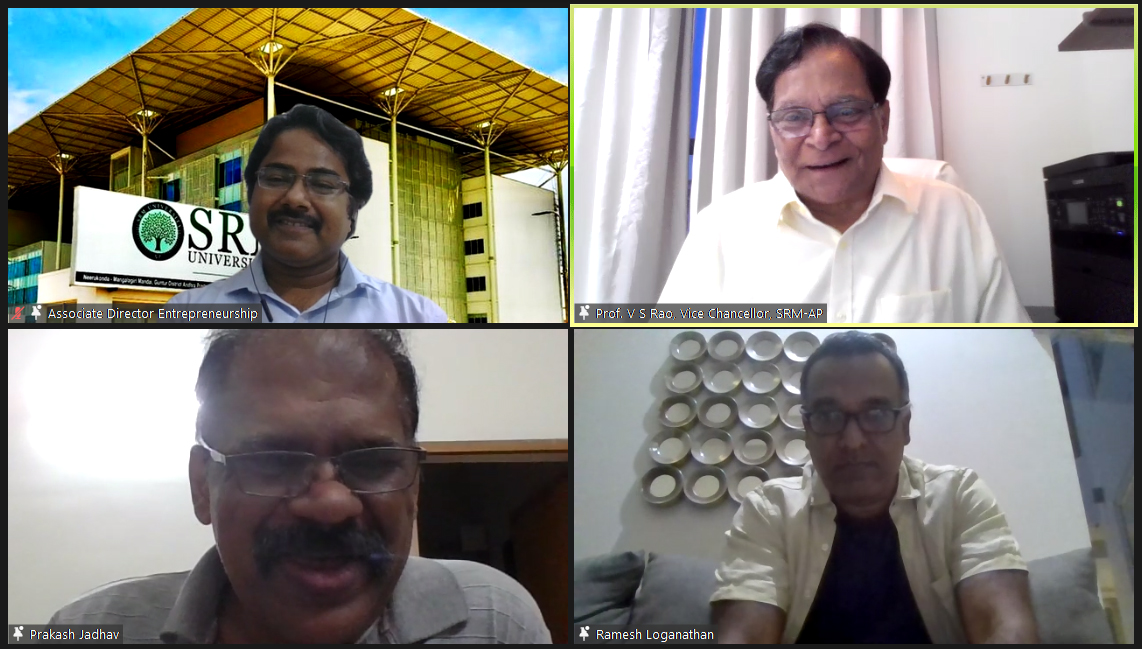 The selected ventures will be mentored and supported for a period of a minimum 12 months where they will be facilitated with infrastructure support, mentoring and networking support, seed fund and innovation fund support, hardware and software support, industry connectivity, learning resources, market exposure and several others.
The selected ventures will be mentored and supported for a period of a minimum 12 months where they will be facilitated with infrastructure support, mentoring and networking support, seed fund and innovation fund support, hardware and software support, industry connectivity, learning resources, market exposure and several others.
The selected ventures will be mentored and supported for a period of minimum 12 months will all the services of a regular technology business incubator. SRM TBI will also provide an opportunity to pitch to the investors, connects with industry experts, market linkage and a global network of mentors. The startups developing prototype and MVP can apply for the Product validation track and pre-revenue/ revenue stage startups can apply for the Market validation track. Each of the 36 startup ventures will get hands-on mentoring and guidance from the mentors and experts from their respective working areas. The startups go through physical interactions through contact sessions at SRM AP and virtual interaction with mentors through online workshops during the program.
After the Q & A session Mr Udayan Bakshi, CEO SRM TBI & Associate Director Entrepreneurship, cordially thanked all the speakers and panellists for their efforts to make the SRM TBI cohort launch a grand success. He also highlighted that TBI will not limit to just this batch of students or to the SRM University-AP, but shall extend its vision and activities to the entire ecosystem
“Films as History; Exploring Historiophoty”-a discussion on defining the relations between Films and History.
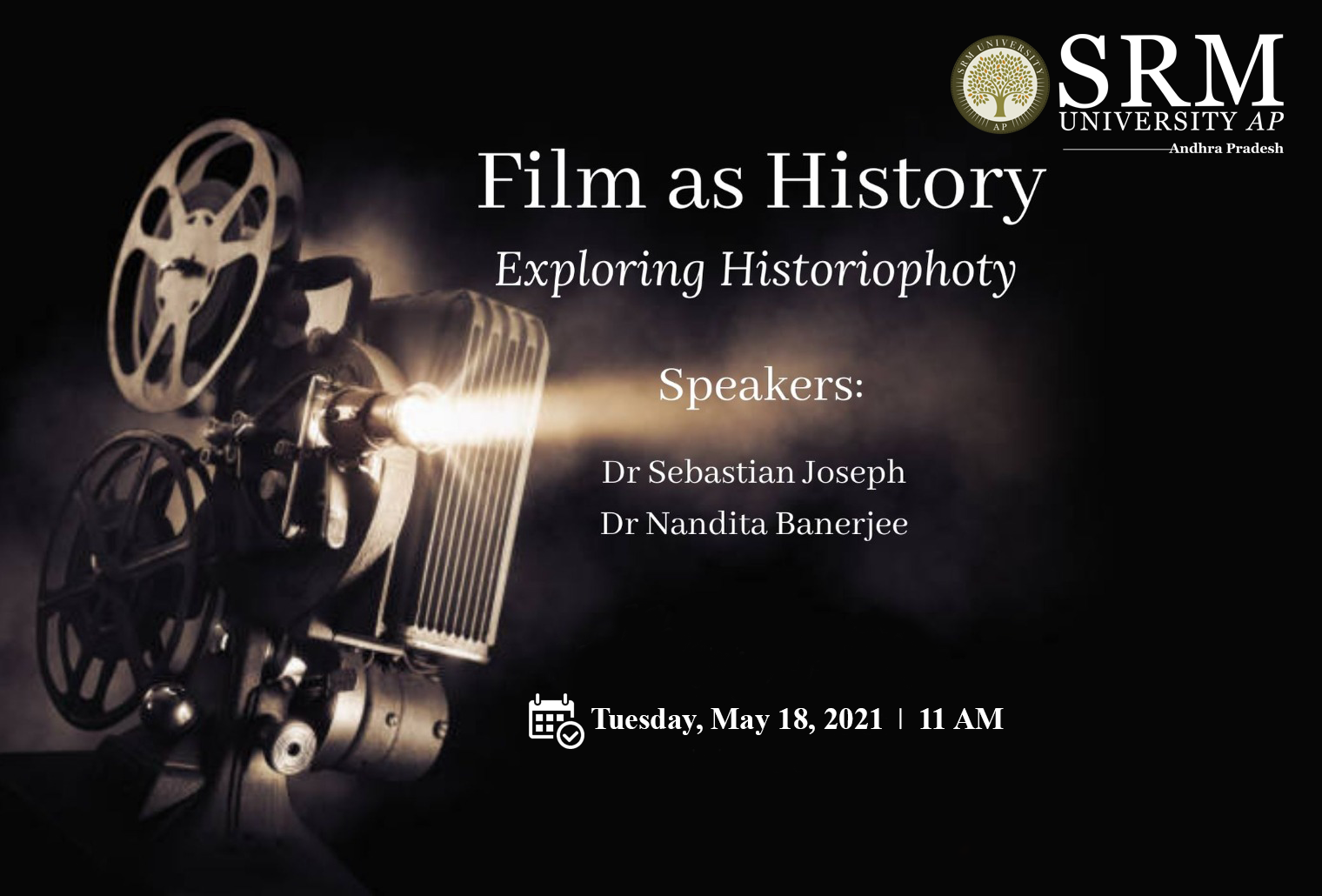 The Department of History, SRM University-AP, initiates a monthly webinar series with a thought-provoking discussion on defining the relations between Films and History. “Films as History; Exploring Historiophoty”, the introductory session of the series, has been scheduled for Tuesday, May 18, 2021, at 11 am.
The Department of History, SRM University-AP, initiates a monthly webinar series with a thought-provoking discussion on defining the relations between Films and History. “Films as History; Exploring Historiophoty”, the introductory session of the series, has been scheduled for Tuesday, May 18, 2021, at 11 am.
Dr Sebastian Joseph, a Historian and Film Critic, will deliver the first talk of the webinar. Dr Joseph was the State Award Winner for Best work on Film History 2020. He has authored Cochin Forests and the British Techno-ecological Imperialism in India.
Dr Nandita Banerjee will be the keynote speaker in the second session of the webinar. She is an Associate Professor at Sindhu Kanho Birsa University and a pioneer in Film History and Visual Studies in History.
The webinar aims to discuss the use of films in particular and visual images in general as sources for the reconstruction of History. It will deal with the promises and challenges of Historiophoty as a sub-stream of history. Following Hayden White’s pathbreaking analysis of visual imagery and its location in historiography, Historiophoty has emerged as a most promising pathway for historians, particularly as we move towards a rapidly digitizing world. The webinar series will introduce students to new and exploratory themes in History.
Join the Webinar Here: https://srmap.zoom.us/j/96304703524?pwd=VVRBY3VLRDdsbEVGTDBBdnY0T2RrQT09
Meeting ID: 963 0470 3524
Passcode: 803909
- Published in Events, History Current Happenings, History Events, Webinars

